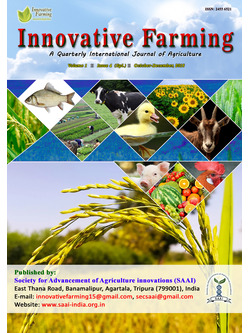
Indigenous Technical Knowledge in Potato Cultivation and Its Storage in Rain Fed Farming Situation of Hailakandi District, Assam
Saurabh Sarma*
Krishi Vigyan Kendra, Hailakandi, ICAR Research Complex for NEH Region, Hailakandi, Assam
Kabita C. Sarma
Krishi Vigyan Kendra, Hailakandi, ICAR Research Complex for NEH Region, Hailakandi, Assam
SK. MD. Azizur Rahman
Krishi Vigyan Kendra, Hailakandi, ICAR Research Complex for NEH Region, Hailakandi, Assam
S.B. Singh
ICAR Research Complex for NEH Region, Mizoram Centre, Kolasib, Mizoram
A.K. Tripathi
ICAR Research Complex for NEH Region, Umiam, Meghalaya
S.V. Ngachan
ICAR Research Complex for NEH Region, Umiam, Meghalaya
DOI: NIL
Keywords: Potato, ITK, insect pests, eco-friendly management, storage
Abstract
This study summarizes the picture of indigenous management practices followed by the farmers of Hailakandi district against insect pests and disease during potato cultivation and its storage. Study was mainly focused on organic farming as indiscriminate use of inorganic chemicals leads to hazardous effects on to all living organisms as well as environment. Potato is an important tuber crop and cultivated popularly by almost all the farming families of the district in small to large scale. Generally farmers of Barak valley prefer the local potato variety (reddish coloured and small in size) for cultivation and thereafter also store the harvested potatoes as seed materials for cultivating in the next year. During its cultivation and storage, farmers witness various problems due to insect pests and diseases. To tackle these problems they adopt many eco-friendly indigenous technologies right from potato seed treatment to its production and storage. Therefore, an effort has been made to inspect suitable indigenous technologies followed by farmers in potato cultivation and its storage. From the study it was revealed that the ITKs based on use of plant extract and application of pesticide mixture prepared from cow urine and tobacco leaves gives very good results in controlling insect pests like red ants, aphids, potato tuber moth, cut worm, white grub etc. and diseases like fungal and bacterial in field condition. Moreover, mixture of lime and organic pesticide mixture helps during storage of potato seeds.
Downloads
not found
Reference
Chakravorthy, K. (1982). Indigenous farm practices: Their influence. M.Sc. Thesis, A.C. & R.I., T.N.A.U., Coimbatore-3.
Chhetry, G. K. N., & Belbahri, L. (2009). Indigenous pest and disease management practices in traditional farming system in North east India - A review. Journal of Plant Breeding and Crop Science, 1(3), 29–39.
Gogoi, S. K. (1989). A study on adoption of recommended plant protection measures in sali rice by the farmers of Jorhat district of Assam. M.Sc. Thesis, A.A.U., Jorhat-13.
Kolawole, O. D. (2001). Local Knowledge Utilization and Sustainable Rural Development in the 21st Century. Indigenous Knowledge and Development Monitor, 9(3), 13–15.
Narayanasamy, P. (2006). Traditional knowledge of tribals in crop protection. Indian Journal of Traditional Knowledge, 5(1), 64–70.
Rajasekaran, B. D. (1993). A Framework for Incorporating Indigenous Knowledge System into Agricultural Research, Extension and NGOs for Sustainable Agricultural Development. Studies on Technological and Social Changes: No. 21, Technology and Social Change Programme. Iowa: Iowa State University, 3–10.
Rajasekaran, B. D., Warren, D. M., & Babu, S. C. (1991). Indigenous Natural Resource Management Systems for Sustainable Agriculture Development - A Global Perspective. Journal of International Development, 3(4), 387–401.
Thrupp, L. (1989). Legitimizing Knowledge, Sciencetized Packages or Environment for Third World People. In: Warren, D. M., Kerner, L. J., & Titilola, S. O. (Eds.), Indigenous Knowledge System: Implication for Agriculture and International Development. Studies in Technology and Social Change, No. 11. Ames, Iowa: Iowa State University, 15–20.
Thurston, H. D. (1992). Sustainable practices for plant diseases management in traditional farming system. Westview, Boulder, CO, pp. 279.
Warren, D. M. (1991). Using Indigenous Knowledge in Agriculture Development. World Bank Discussion Paper No. 27. Washington, D.C.: The World Bank.
Warren, D. M., & Cashman, K. (1988). Indigenous Knowledge for Sustainable Agriculture and Rural Development. Gatekeeper series No. SA 10, Sustainable Agricultural and Rural Development Programme, London: IIED.
